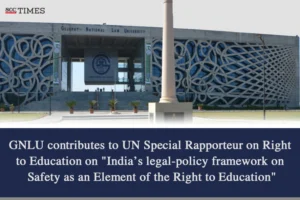GNLU Centre for Public and Private International Law
Gandhinagar, December 21, 2024
The GNLU Centre for Public and Private International Law (GCPIL) has submitted a written response to the Call for Contributions issued by the United Nations Special Rapporteur on Right to Education inviting submissions on the topic of “Safety as an aspect of right to education and as a precondition to its full realization”.
The Special Rapporteur on the Right to Education is an independent human rights expert appointed by the United Nations Human Rights Council (‘UNHRC’). On 19-11-2024, for upcoming report to be presented at the 59th session of the Human Rights Council in June 2025, the United Nations Special Rapporteur on the Right to Education, Ms. Farida Shaheed, invited States, United Nations agencies, funds and programmes, national human rights institutions, academics, educators, business actors, as well as civil society organizations to share their views and experiences on ‘safety as an element of the right to education and a precondition for its full realization’.
States, including India, have ratified the following conventions and have an international obligation to ensure schools provide secure, non-discriminatory learning environments that foster the right to education. This commitment stems from key international instruments, including Article 26 of the Universal Declaration of Human Rights (UDHR), Article 19 of the Convention on the Rights of the Child (CRC), and Article 13 of the International Covenant on Economic, Social and Cultural Rights (ICESCR). Including its alignment with Sustainable Development Goal 4 (SDG 4), which advocates for inclusive, equitable, and quality education for all, including safe and effective learning environments. The Special Rapporteur, through “Call for Contributions” (under the mandate of the Special Rapporteur), aims to evaluate the implementation of international standards, national policies, and community-led initiatives to ensure physical, digital, and emotional safety in educational settings.
The GNLU Centre for Public and Private International Law (GCPIL) submitted its contribution for ‘India’ providing an overview of India’s constitutional and international obligations in respect of the right to education and enlisted specific statutory provisions, policies, guidelines, or cases that ensure that a holistic right to education is provided to students, including facets such as health, psychosocial and physical safety, and security of students. The response was undertaken by an in-depth study carried out by 8 law students — Masoom Sanyal, Anushka Bhatt, Souniya Dhuldhoya, Palak Siwach, Sithara B Fatima, Sia Shah, Prathamesh Bhagure and Vinayak Malhotra — to support the Special Rapporteur’s efforts in addressing critical questions on ensuring safety in educational settings in India delved into vital legal frameworks such as IT Act, 2000, the Right to Education (RTE) Act, 2009, Protection of Children from Sexual Offences (POCSO) Act, 2012, Juvenile Justice Act, 2015, Digital Personal Data Protection Act, 2023, and Bharatiya Nyaya Sanhita (BNS), 2023. It also provided information on existing government initiatives such as the PM-POSHAN Scheme, Manodarpan Portal, Sainik Schools Society Rules, National Disaster Management Guidelines, School Safety Policy, whole school safety approach, NCERT guidelines including those outlined in the National Building Code of India with emphasis on landmark Supreme Court judgment in Avinash Mehrotra v. Union of India 2009 (6) SCC 398, which laid down that the right to safe environment is inherent in the right to education. Their work focuses on analyzing key national legislations, government policies, schemes, guidelines, including statistical data as provided by National Crimes Record Bureau and other agencies. The contribution will be published on the website of the Office of the United Nations High Commissioner for Human Rights (OHCHR).
Prof Dr S Shanthakumar, Director, GNLU, who supervised the research, noted that,
“These contributions are immensely beneficial not only for our students but for India as a whole. This research showcases the best practices and policies of our government, providing an opportunity to emphasize India’s proactive measures. At the same time, our students gain invaluable experience in understanding and applying the law in practice, bridging the gap between theory and real-world application.”
Dr. Harsha Rajwanshi, Co-Head, GCPIL, who closely supervised the students, emphasized the significance of such initiatives stating that,
“It is important for law schools to engage in meaningful research to deepen the understanding of our legal ecosystem. This not only enriches the academic journey of students but also positions the university as a responsible leader contributing to nation-building through its research expertise before UN Bodies and agencies at international level.”
The student members involved in the research stated,
“Submitting research of this magnitude is a practice often associated with foreign law schools that provide critical inputs to global legal and policy discussions. Undertaking this project was an overwhelming and enriching experience for us, allowing us to deeply engage with complex legal frameworks and practical challenges. It also reflects GNLU’s alignment with the vision of the National Education Policy, emphasizing experiential learning, research excellence, and contributing to nation-building through academic endeavors.”

